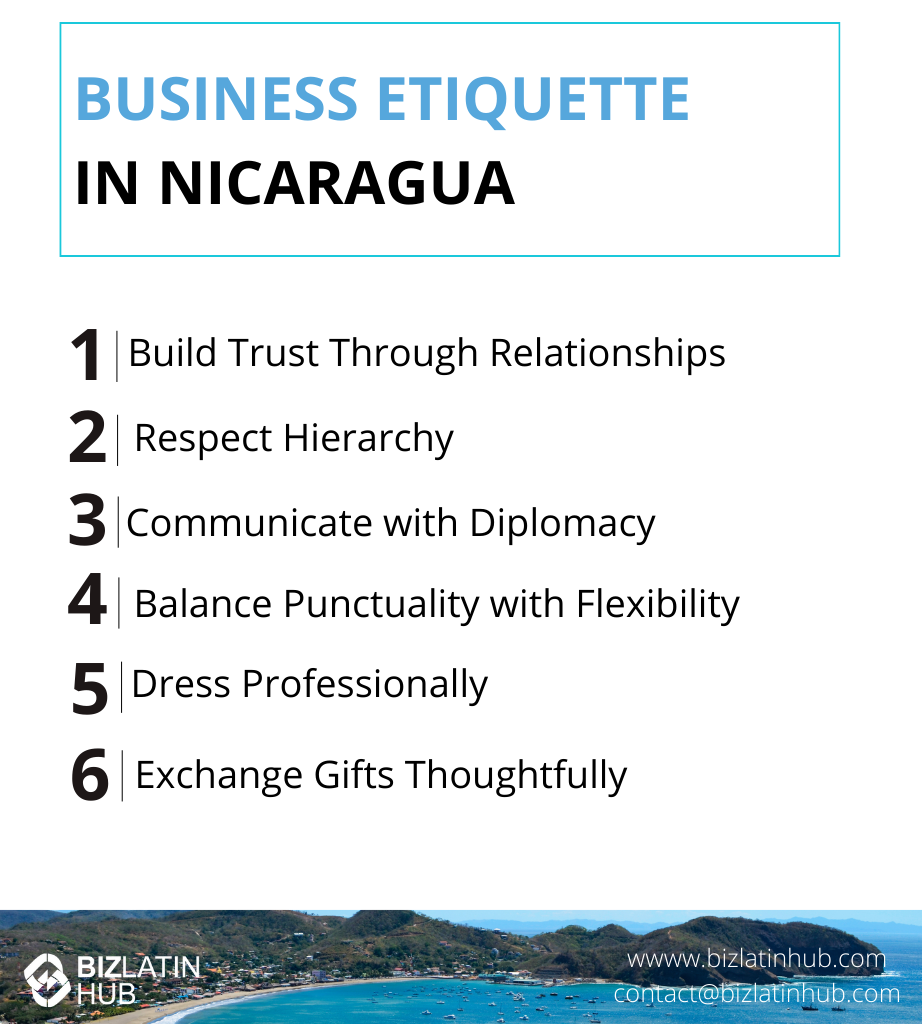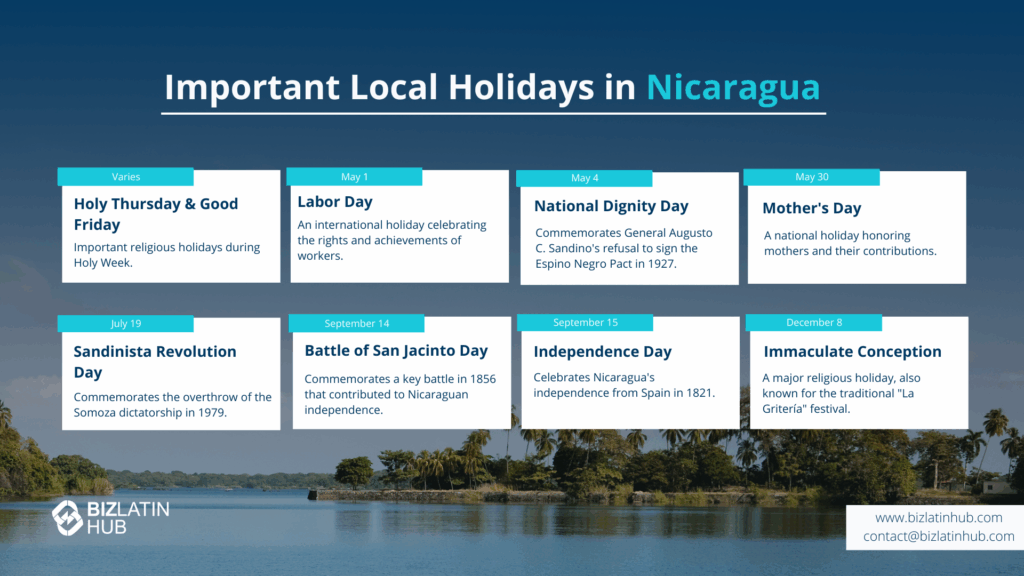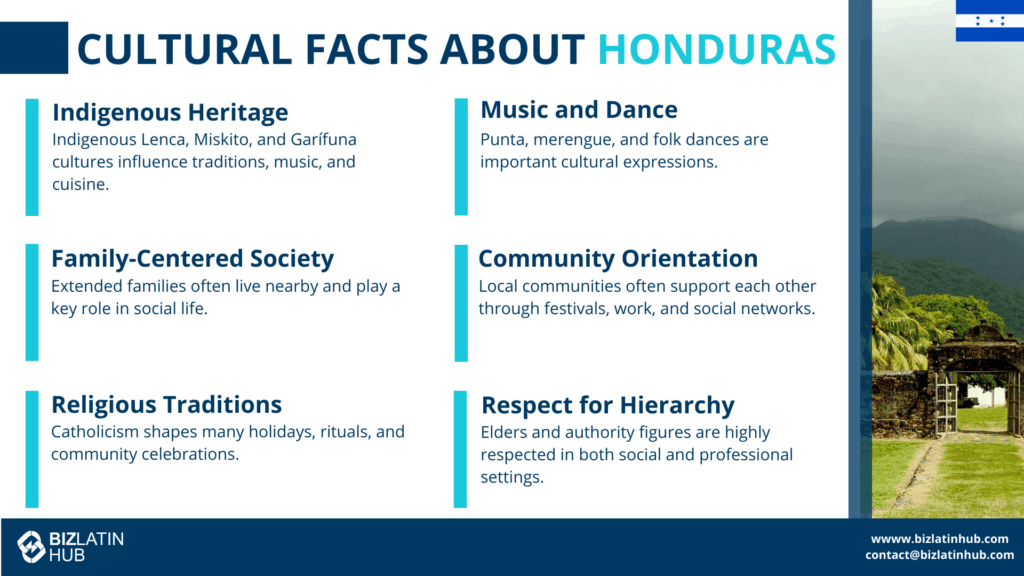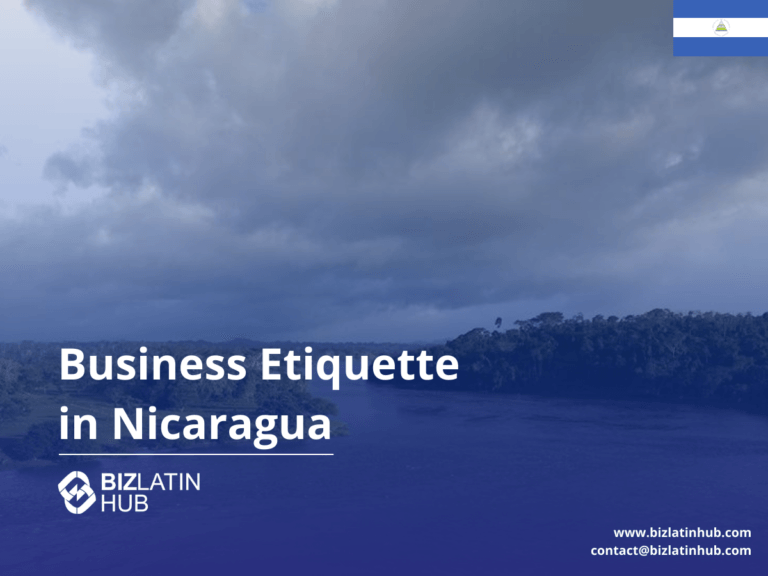Success in Nicaraguan business depends on understanding local etiquette. The country has a specific culture that affects professional interactions. This guide explains Nicaraguan business customs, communication, and professional conduct for successful business engagements. For business formation in Nicaragua, this is critical. This guide provides essential tips on navigating the professional culture of Nicaragua, from building trust to understanding communication styles, to help you succeed in your business dealings.
Key Takeaways: Business Etiquette in Nicaragua
| Why is building personal trust (confianza) essential? | Business is done with people, not companies. Time spent in small talk and getting to know your counterparts personally is a crucial investment in building this trust. |
| Is timekeeping important? | Punctuality is important for foreigners, but meetings may not start on time. |
| What is the standard for professional attire? | Dress formally. A conservative suit is the standard for both men and women. |
| How are business negotiations typically conducted? | The communication style is often indirect to maintain harmony. |
Key Principles of Nicaraguan Business Culture
Nicaraguan business culture is strongly relationship-oriented. Trust and personal connections (confianza) are often more important than the details of a contract. The pace of business is generally slower and more relaxed than in North America or Europe, with a strong emphasis on politeness and social harmony.
Personal relationships are vital in Nicaragua’s business environment. Nicaraguans build trust before making business agreements. Speaking some Spanish helps create rapport, though many business professionals speak English.
Time is flexible in Nicaragua, so patience is a valuable quality. Face-to-face meetings are important for building connections. Conversations often include personal topics like family, which helps build trust. Gift-giving is also a common practice that strengthens business relationships.
Key points of Nicaraguan business culture include:
- Strong personal relationships
- Spanish language for rapport
- Flexible approach to time
- Patience and politeness
- Value of face-to-face meetings
- Goodwill through gift-giving
Understanding these points helps foreign investors and professionals work effectively in Nicaragua.
1. Building Personal Relationships (Confianza)
Invest significant time in small talk and getting to know your business partners personally before discussing business. Personal connections are the foundation of business in Nicaragua. Trust and friendship are very important. People make decisions based on mutual respect, so you should invest time in getting to know business partners personally.

Networking helps businesses succeed in Nicaragua. A good network of partners simplifies operations. You can build this network at events or community gatherings. Informal conversations and meetings create strong business connections. Discussing personal interests helps build cooperation and trust. Courteous exchanges and giving gifts also improve networking efforts.
2. Communication and Saving Face
Communication is often indirect. Be polite and diplomatic, and avoid direct criticism or saying “no” bluntly, as this can cause offense. Business communication in Nicaragua focuses on relationships. Interactions often build personal connections before dealing with business information. People use indirect communication to maintain harmony. Spanish is the official language, so understanding its verbal and non-verbal signals is essential.
Spanish is the primary language for business. Many professionals also speak English, which helps foreign investors. Use formal titles like Señor or Señora until a person invites you to be informal. Simple phrases like “Gracias” and “Por favor” build goodwill. Nicaraguans appreciate expressive gestures but avoid excessive drama. Active listening, shown with nods and eye contact, shows interest and strengthens business relationships.
Non-verbal signals are important in Nicaraguan business. A firm handshake and hand movements add to communication. The “thumbs-up” gesture is positive, but the “OK” sign can be offensive. Maintain relaxed eye contact to show respect. A light touch on the arm or shoulder is a common way to show warmth during a discussion. These signals help convey sincerity.
Expert Tip: Interpreting “Yes”
From our experience, a key challenge for foreigners is navigating the indirect communication style used to preserve harmony. In Nicaragua, a “yes” does not always mean “I agree.” It can often mean “I hear you and I do not wish to offend you by disagreeing.” Similarly, you may not receive a direct “no.”
Instead, you might hear vague responses like “we will see” or “perhaps.” It is crucial to pay attention to body language and to confirm agreements politely over time rather than assuming a single “yes” means the deal is done. This avoids misunderstandings and respects the local custom of avoiding direct confrontation.
3. Attitude Towards Time and Punctuality
Be punctual to show respect, but be prepared for a flexible start time from your local counterparts. The relationship is more important than a strict schedule. Punctuality in Nicaragua balances flexibility with respect. Arriving more than 30 minutes late without a good reason is impolite.
You should arrive on time or early for meetings. This provides time for small talk, which is important for personal connections. An agenda and confirmed appointments show professionalism.
4. Dress Code and Appearance
Dress formally. A conservative suit is the standard for both men and women. Proper dress is also a sign of respect. Men should wear classic suits in neutral colors. Women should wear professional dresses or skirt suits that are modest and elegant.
In many meetings, an open-collar shirt is acceptable. Avoid overdressing, as it may appear that you feel superior. Your clothing choice shows your understanding of local social norms.
5. The Negotiation Process
Negotiations can be slow and may involve multiple meetings. Decisions are made by the highest-ranking person, often after extensive discussion.
Business meetings in Nicaragua often begin with extended casual conversation to build rapport. The formal agenda may not be strictly followed. The goal of the first meeting is often to establish a personal connection rather than to make a final decision.
Negotiations are typically slow and relationship-focused. Nicaraguans may avoid direct confrontation to preserve harmony. Final decisions are usually made by the most senior person in the hierarchy, so identifying that individual is important. While verbal agreements are significant, you should always document all final terms in a formal, written contract for legal clarity.
Gift-Giving Protocol
Giving a gift is a welcome gesture that strengthens relationships. Appropriate gifts include high-quality items with your company’s logo or a specialty from your home country. Avoid giving gifts that are overly expensive or personal at the beginning of a relationship. It is best to present a gift after a business deal is closed or during a social meal, rather than at an initial meeting. This timing frames the gift as a sign of appreciation, not a bribe.
Understanding Hierarchical Structures
Nicaraguan businesses usually have clear hierarchies. This structure affects how business is done. People respect authority and seniority. Decisions come from top-level management. Managers typically give direction rather than ask for participation. Strong personal connections can help you work within this hierarchy.
To cooperate with local leadership, you must build trust. Start conversations on personal topics before discussing business. Social events like coffee or lunch offer insight into cultural norms. Working with local legal advisors can also help you understand the country’s legal system.
Cultural Norms and Public Holidays
To succeed in Nicaragua, you must observe cultural norms and holidays. Personal relationships form the base of business deals. Exchanging small gifts and sharing meals helps strengthen professional bonds.
Key Nicaraguan Holidays and Their Impact
National holidays affect business schedules. Plan your business activities around these key dates.
| Holiday | Date(s) | Impact on Business |
|---|---|---|
| New Year’s Day | January 1 | Businesses mostly closed |
| Holy Week (Semana Santa) | Varies (March/April) | Closures or reduced hours |
| Labor Day | May 1 | Widespread business closures |
| Revolution Day | July 19 | Nationwide business closures |
| Independence Day | September 15 | Widespread business shutdowns |

The Local Economy and Legal System
Nicaragua’s economy is mainly agricultural. It is one of the least developed countries in Central America but has shown periods of strong growth. The GDP grew 4.6% in 2023, often due to export demand and consumer spending. Key industries are agribusiness, light manufacturing, and outsourcing services. The country’s low operational costs and growth opportunities attract foreign investors.
Legal and Labor Rules
Businesses in Nicaragua must follow local laws. The Nicaraguan Labor Code sets the rules for all employment relationships, for both national and foreign employees. Contracts cannot waive these mandatory rules. Any contract term that contradicts the Labor Code is not valid.
Contracts must also follow local laws. They can only be changed for a legal reason or with mutual agreement. A court resolves contract disputes through a summary civil process.

Frequently Asked Questions: Nicaraguan Business Etiquette
What is the most important factor for business success in Nicaragua?
The most important factor for business success in Nicaragua is building strong, trust-based personal relationships. Business transactions depend more on interpersonal trust than on contractual agreements. It is essential to spend time in informal conversations and social settings to establish rapport before shifting focus to formal business matters.
Should I be on time for meetings?
As a foreign businessperson, you should always be punctual. However, do not be surprised if your Nicaraguan counterparts are 15 to 30 minutes late. Patience is key; showing frustration is considered rude.
What should I wear to a business meeting?
The dress code is formal and conservative. Men should wear a dark suit and tie. Women should wear a smart dress or a skirt suit. Appearance is important and reflects your professionalism.
What is “confianza”?
“Confianza” means trust. It is the foundation of business in Nicaragua. Business is done with people, not companies. Time spent in small talk and getting to know your counterparts personally is a crucial investment in building this trust.
How should I approach business negotiations in Nicaragua?
Negotiations should be approached with patience and an emphasis on maintaining a positive relationship. Decisions are usually made by the top executive, and the process may be lengthy. Avoid direct confrontation; instead, be mindful of indirect language like “we will see” or “it’s complicated” as polite ways of expressing disagreement. Final agreements should always be formalized in writing.
Is gift-giving common?
Gift-giving is not a required part of business, but a small, thoughtful gift from your home country (such as a book or a high-quality pen) can be a nice gesture at the conclusion of a successful negotiation.
Biz Latin Hub can help you with business culture in Nicaragua
At Biz Latin Hub, our multilingual team of company formation specialists has extensive experience in supporting foreign executives when starting a business in Latin America. We offer a complete set of services for your business needs, such as legal, accounting, and recruitment support.
You can rely on us as your main contact for entering and doing business in any of the 18 markets in Latin America and the Caribbean where we operate.
Contact us now for personalized assistance or a free quote on company formation in Latin America.
Learn more about our team and expert authors.






